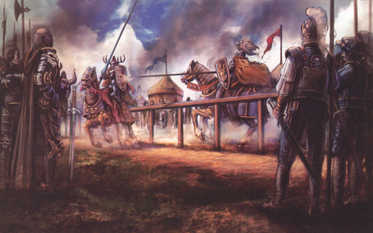
The spirit of competition is strong among the people of the Empire. People congregate to watch sporting events, play games, and a number of other pastimes, pitting themselves against a rival. No competition, however, draws the people like the Jousting Tournament, a Bretonnian custom that spread to the Empire. It is a competition where armoured knights on equally armoured steeds bear down on one another with lances levelled with the intent to unseat their opponent.[1a]
There are three basic jousting contests. The first is the Joust of Peace, wherein the knights use blunted lances to prevent the games from turning lethal; although casualties do sometimes occur.[1a]
In many festivals, such a joust is presented as a pas d'armes — a local lord places a banner on his keep's walls as an invitation for travelling knights to participate. These events are the best means for an unproven knight ot make a name for himself.[1b]
The second tournament is the Joust of War. Here, knights use sharp lances, and the combat is lethal. Jousts of War are used to settle grudges, duels, or right wrongs in an honourable fashion. Sometimes the tournaments serve to avoid a war or to start one. In any event, the battle between the knights continues until one yields or dies.[1b]
The Joust at Large is a kind of general melee, having knights organised into teams. Each side charges as in a standard joust, but after the initial charge, they fall back to hand weapons, fighting with longsword, axe, or mace. Depending on the agreed-upon rules, combat may continue after a knight is unhorsed, and in many instances (especially while at war), there's little difference between a Joust at Large and actual open combat.[1b]
Victory Conditions
Knights gain points based on the result of their pass. A herald tallies the points, announcing the victor at the end of the contest. The following guidelines are general only; many possible variations apply:[1b]
Condition --- Point[1b]
- Striking an Opponent +1
- Missing an Opponent -1
- Shivering a Lance +1
- Unseating Opponent +3
Conduct
Regardless of alignment, there are certain rules all jousters must abide by, and violation is grounds for dishonour. The key rules are as follows.[1b]
- Jousters may never strike opponents from behind.[1b]
- Jousters may never target an opponent's steed.[1b]
- Jousters may not continue to fight after unhorsing their foe, unless such action has been sanctioned before the match.[1b]
- Jousters may not enhance their prowess with spells, but enchanted weapons and armour are sometimes permissible.[1b]
Rewards
Typically, the spoils of a successful match are the loser's horse, armour, and weapons, the victor holding the items for ransom until the loser can match their value in gold. More expensive and elaborate tournaments offer a purse to the winner containing anything from gemstones, coin, or other treasure, to a grant of land and title or even the hand of a noble heir. As well, a knight who finds success at a tournament may be given the opportunity to choose the ritual queen or king of the tourney, to embark on an important mission, or to become a full-fledged member of the local court.[1b][1c]
